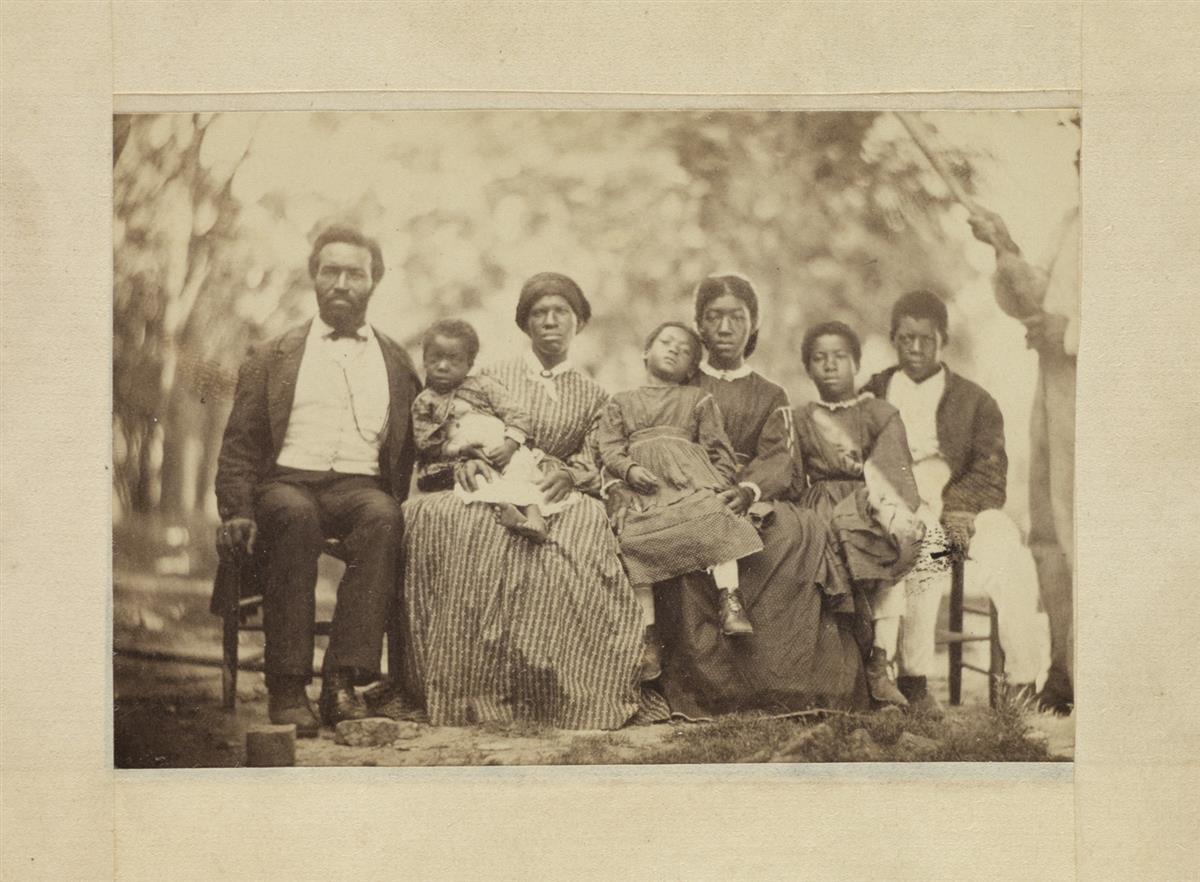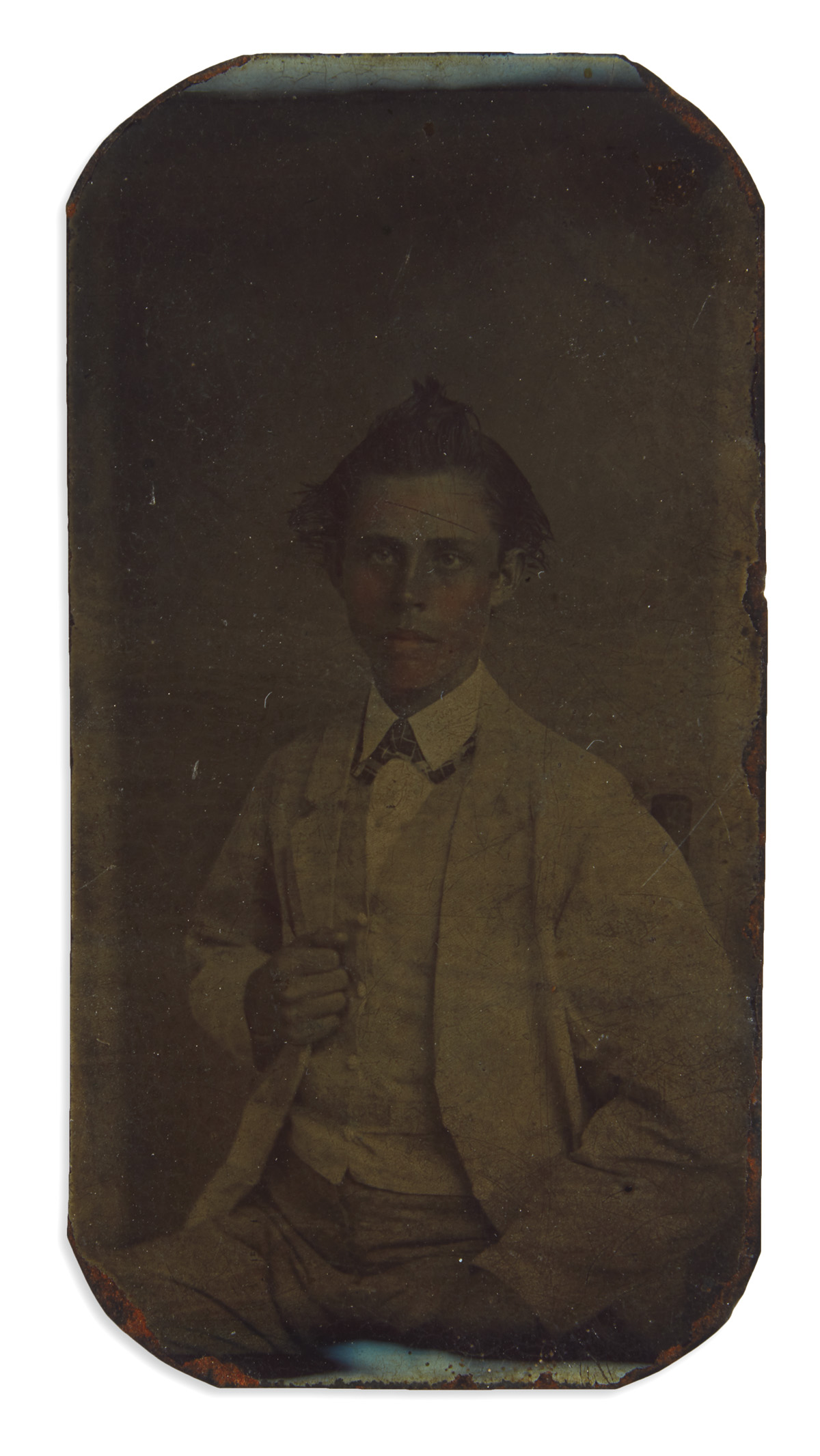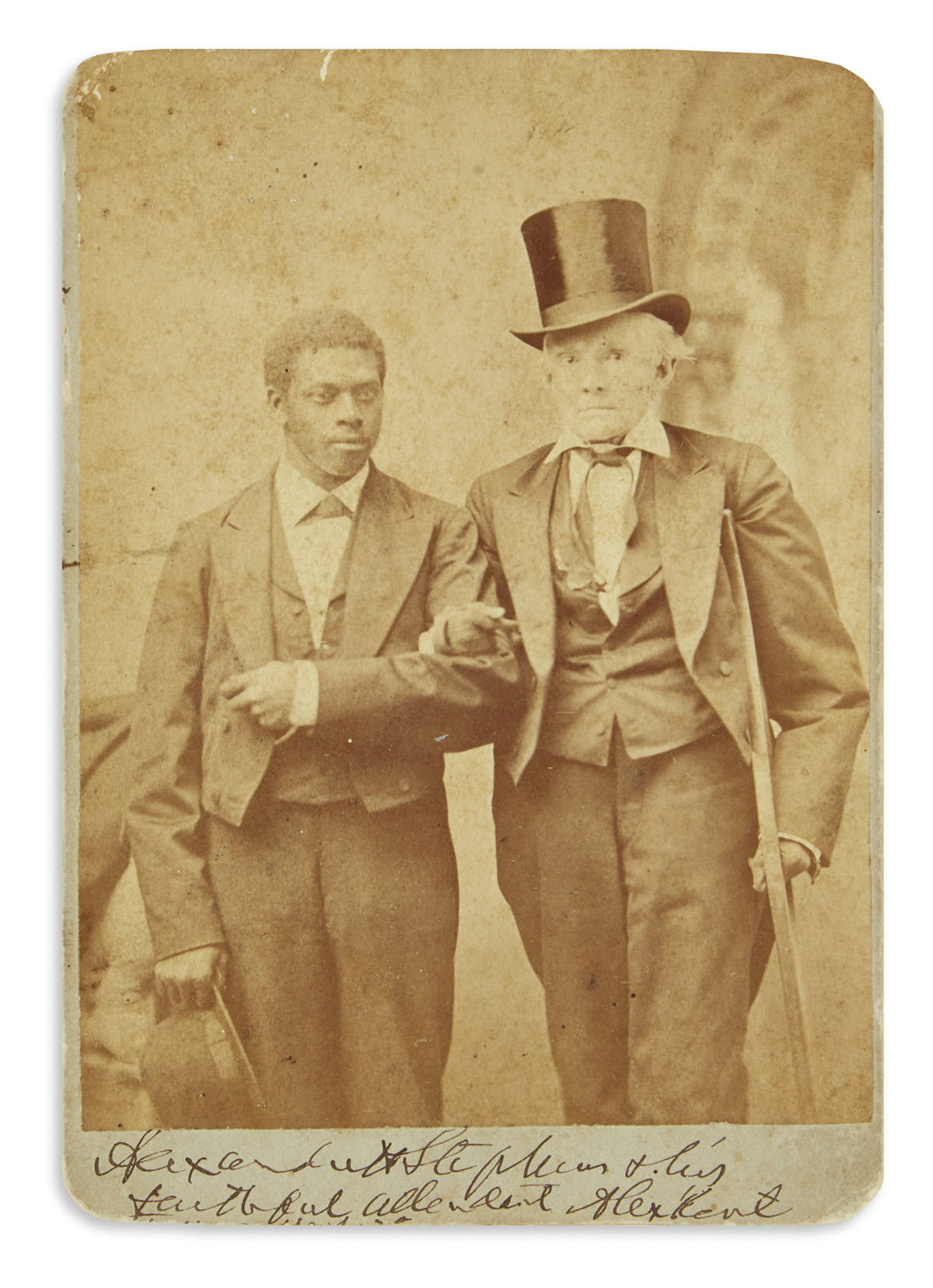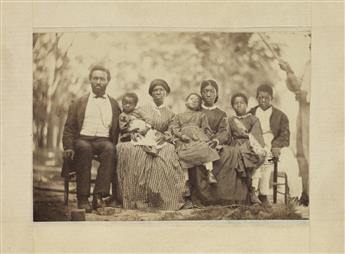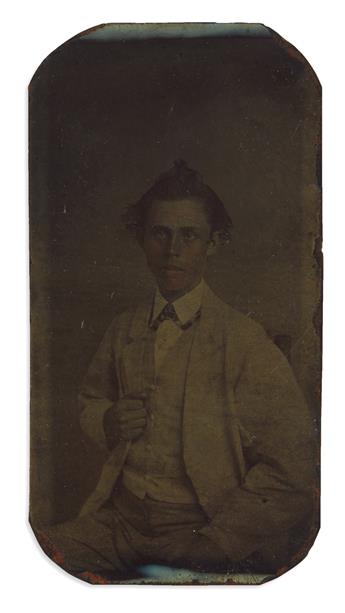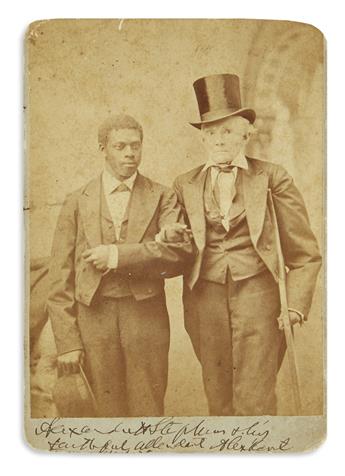Sale 2534 - Lot 260
Price Realized: $ 16,000
Price Realized: $ 20,000
?Final Price Realized includes Buyer’s Premium added to Hammer Price
Estimate: $ 25,000 - $ 35,000
(FAMILY PAPERS.) Papers of two parallel Stephens families: the Confederate Vice President Alexander Stephens and his servants. 19 items in one binder; various sizes and conditions. Vp, 1866-1907 and undated
Additional Details
Dora Stephens (circa 1858-1931), her parents and siblings were born into slavery just like many Georgia families. Unlike most families, however, their owner was Alexander Hamilton Stephens (1812-1883), who became the vice president of the Confederate States of America. After the end of the war, they and other former slaves remained in his employ as household servants at his Liberty Hall in Crawfordsville, GA. This lot consists of correspondence and photographs relating to the vice president and especially these other less famous Stephenses.
The earliest dated item in the collection is a March 1882 letter from A.H. Stephens to Dora, written while he was serving in the United States House of Representatives. Though in a secretarial hand, it is on printed Congressional letterhead. The letter is personal and friendly: "Jno. Stephens wrote to me about Fannie's marriage & gave me a full account of the nice time she had at her wedding. I hope she and Mr. Jones may do well. Am glad to know that Genie & John Taylor are at school. . . . Kind regards to your mother. . . . My secretary sent you a post office order for $5 from Alex Kent on Saturday." A full half of the letter commiserates over the recent death of an old blind cow named Beck: "I deeply sympathized with her in seeing her move about on the lot in search of grazing spots." The following year, he left Dora a gold watch in his will.
9 letters from Dora to her mother Eliza are also included, dated 1897 and 1898. Dora (then unmarried and approaching 40 years of age) had left home to serve as a private nurse for a family in Rome, GA, in an effort to clear out personal debts. Her first report was enthusiastic: "I am very much pleased with my trip so far. My work is very confinding but I am going to make the best of it that I can, as I have got to work for a living." After a month, she noted "I have not had a chance to go out and vew the city yet. I have not been outside of the gate since I came here." Dora's family was apparently somewhat well off, and employed a servant of their own to help the family in Dora's absence. Dora seemed to want to supervise from afar: "Are you making Anna do my work or not? I want you to. If I was at home, I would have her cleaning up real nicely, irning, washing & washing up the dishes. If she is no help to you, there is no use in keeping her. If I live to get back there, she had better know how to do something." Dora seemed quite devoted to the historical legacy of her former master, asking her mother for artifacts during a round of renovations at the late vice president's home: "Please get me a piece of the papering off of Liberty Hall walls, and chip me a little of the wood of the house and send it in a letter." In another letter, she seems quite distraught at the loss of a photograph: "Tell Leonora to find out who took Mr. Stephens photograph out of my box that was in the front room. I would not take eney thing for it. Find out who got it, and get it. I am so anxious about it. It was in there a few days before I left. I wish that I had kept him in my trunk. Tell her to be sure and get that picture if she can." Dora's commitment appeared to be lifelong. When a statue of Stephens was presented to the United States Congress in 1927, Dora Stephens participated in the ceremony as his "only living slave." She left a small bequest in her 1931 will (not present) to the United Daughters of the Confederacy "who are and have always been my good friends."
Two other letters in the lot are addressed to the vice president's white relations. One is from cousin William T. Reid to Linton Stephens, notable mainly for its small floor plan sketch of Liberty Hall. The latest dated item is a 1907 letter to Mrs. [Mary Emma Corry] Holden, great-niece of Alexander Stephens. It discusses a proposed newspaper article on Liberty Hall, and adds in passing "If you see the old servants at Liberty Hall soon, tell them howdy for me." Finally, a 34-page transcript is titled "Hon. A.H. Stephens' Speech Delivered at Hartwell, Ga., Aug. 15 1878." This congressional campaign stump speech notes that "the colored people know the interest I took in the Freedmen's Bank, as I collected every dollar due them that could be got without the charge of an attorney. In my opinion I think the government ought to redeem every dollar that has not been recovered. They invested thinking the government was bound for it & they being cheated & swindled under that idea, I think the government ought to pay them for it" (page 21).
Finally, the collection includes 6 period photographs. A carte-de-visite portrait of Alexander H. Stephens, captioned recto and verso, was printed circa 1865 by E. Anthony of New York from a Brady negative. A cabinet card of Stephens shows him holding onto the arm of his longterm valet Alexander Kent (1850-1903), while another tintype photograph of perhaps the same young man is captioned on verso "A.K. Stephens." In this portrait he seems to bear a strong facial resemblance to the vice president. A small family portrait dated 1866 shows the recently emancipated Dora Stephens and her parents, taken "in the grove at Liberty Hall" (illustrated) while another shows "Jane, one of Mr. Stephens favorite servants, taken in 1866, the chambermaid." Finally, another tintype is captioned "Dora Stephens," though she bears no resemblance to the young Dora Stephens in the 1866 family portrait.
These papers apparently descended through the family of the Confederate Vice President Alexander H. Stephens, rather than through the family of his servant Dora Stephens. The vice president had no children of his own. However, in 1878 he took in his widowed niece Mary Matilda Stephens Corry (1836-1889) and her children. The latest dated letter is addressed to her daughter Mary Emma Corry Holden (1872-1944), still living in Crawfordsville; one of her sons Frank A. Holden (1894-1975) was active in promoting the legacy of his great-great-uncle Alexander Stephens into the 1960s. (See Andrew Sparks, "A Day with Alexander Stephens," read into the Congressional Record, 24 February 1969.) A more detailed summary of this important archive is available upon request.
The earliest dated item in the collection is a March 1882 letter from A.H. Stephens to Dora, written while he was serving in the United States House of Representatives. Though in a secretarial hand, it is on printed Congressional letterhead. The letter is personal and friendly: "Jno. Stephens wrote to me about Fannie's marriage & gave me a full account of the nice time she had at her wedding. I hope she and Mr. Jones may do well. Am glad to know that Genie & John Taylor are at school. . . . Kind regards to your mother. . . . My secretary sent you a post office order for $5 from Alex Kent on Saturday." A full half of the letter commiserates over the recent death of an old blind cow named Beck: "I deeply sympathized with her in seeing her move about on the lot in search of grazing spots." The following year, he left Dora a gold watch in his will.
9 letters from Dora to her mother Eliza are also included, dated 1897 and 1898. Dora (then unmarried and approaching 40 years of age) had left home to serve as a private nurse for a family in Rome, GA, in an effort to clear out personal debts. Her first report was enthusiastic: "I am very much pleased with my trip so far. My work is very confinding but I am going to make the best of it that I can, as I have got to work for a living." After a month, she noted "I have not had a chance to go out and vew the city yet. I have not been outside of the gate since I came here." Dora's family was apparently somewhat well off, and employed a servant of their own to help the family in Dora's absence. Dora seemed to want to supervise from afar: "Are you making Anna do my work or not? I want you to. If I was at home, I would have her cleaning up real nicely, irning, washing & washing up the dishes. If she is no help to you, there is no use in keeping her. If I live to get back there, she had better know how to do something." Dora seemed quite devoted to the historical legacy of her former master, asking her mother for artifacts during a round of renovations at the late vice president's home: "Please get me a piece of the papering off of Liberty Hall walls, and chip me a little of the wood of the house and send it in a letter." In another letter, she seems quite distraught at the loss of a photograph: "Tell Leonora to find out who took Mr. Stephens photograph out of my box that was in the front room. I would not take eney thing for it. Find out who got it, and get it. I am so anxious about it. It was in there a few days before I left. I wish that I had kept him in my trunk. Tell her to be sure and get that picture if she can." Dora's commitment appeared to be lifelong. When a statue of Stephens was presented to the United States Congress in 1927, Dora Stephens participated in the ceremony as his "only living slave." She left a small bequest in her 1931 will (not present) to the United Daughters of the Confederacy "who are and have always been my good friends."
Two other letters in the lot are addressed to the vice president's white relations. One is from cousin William T. Reid to Linton Stephens, notable mainly for its small floor plan sketch of Liberty Hall. The latest dated item is a 1907 letter to Mrs. [Mary Emma Corry] Holden, great-niece of Alexander Stephens. It discusses a proposed newspaper article on Liberty Hall, and adds in passing "If you see the old servants at Liberty Hall soon, tell them howdy for me." Finally, a 34-page transcript is titled "Hon. A.H. Stephens' Speech Delivered at Hartwell, Ga., Aug. 15 1878." This congressional campaign stump speech notes that "the colored people know the interest I took in the Freedmen's Bank, as I collected every dollar due them that could be got without the charge of an attorney. In my opinion I think the government ought to redeem every dollar that has not been recovered. They invested thinking the government was bound for it & they being cheated & swindled under that idea, I think the government ought to pay them for it" (page 21).
Finally, the collection includes 6 period photographs. A carte-de-visite portrait of Alexander H. Stephens, captioned recto and verso, was printed circa 1865 by E. Anthony of New York from a Brady negative. A cabinet card of Stephens shows him holding onto the arm of his longterm valet Alexander Kent (1850-1903), while another tintype photograph of perhaps the same young man is captioned on verso "A.K. Stephens." In this portrait he seems to bear a strong facial resemblance to the vice president. A small family portrait dated 1866 shows the recently emancipated Dora Stephens and her parents, taken "in the grove at Liberty Hall" (illustrated) while another shows "Jane, one of Mr. Stephens favorite servants, taken in 1866, the chambermaid." Finally, another tintype is captioned "Dora Stephens," though she bears no resemblance to the young Dora Stephens in the 1866 family portrait.
These papers apparently descended through the family of the Confederate Vice President Alexander H. Stephens, rather than through the family of his servant Dora Stephens. The vice president had no children of his own. However, in 1878 he took in his widowed niece Mary Matilda Stephens Corry (1836-1889) and her children. The latest dated letter is addressed to her daughter Mary Emma Corry Holden (1872-1944), still living in Crawfordsville; one of her sons Frank A. Holden (1894-1975) was active in promoting the legacy of his great-great-uncle Alexander Stephens into the 1960s. (See Andrew Sparks, "A Day with Alexander Stephens," read into the Congressional Record, 24 February 1969.) A more detailed summary of this important archive is available upon request.
Exhibition Hours
Exhibition Hours
Aliquam vulputate ornare congue. Vestibulum maximus, libero in placerat faucibus, risus nisl molestie massa, ut maximus metus lectus vel lorem.



